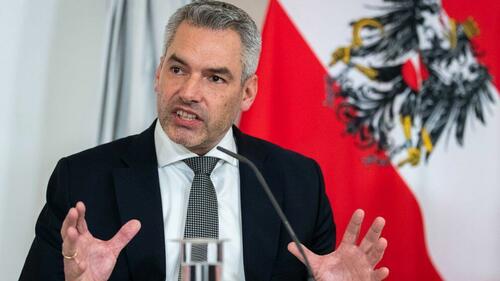"It Doesn't Work" For Us - Austrian Chancellor Rejects Biden's Pressure To Boycott Russia Energy
As President Biden struggles to convince America's European allies to bite the bullet and agree to tougher sanctions on Russian energy during his trip to Brussels (where he is participating in meetings with NATO, the G-7 and the EU), Austrian Chancellor Karl Nehammer offered the latest example of why this this will likely be a futile effort on Biden's part, as uniting Europe in opposition to Russia simply isn't feasible given its dependence on Russian oil and gas.
Nehammer
Speaking Thursday, Nehammer denied reports in the Austrian press claiming his government was in talks to agree to an embargo on Russian energy. The reality couldn't be further from the truth he said, adding that talk of a Russian energy boycott is "unrealistic and wrong".
"It doesn't work. Austria gets 80% of its gas from Russia." What's more, rumors of a boycott are harmful in and of themselves, because they serve to drive energy prices higher.
Austria depends on Russia for nearly 60% of its total energy consumption, and an even larger share of its natural gas imports, as Nehammer noted, which is why growing pressure from US President Joe Biden to restrict imports of Russian energy simply isn't feasible.
Speaking later in the day ahead of a meeting of EU leaders, Nehammer reiterated that Austria was opposed to a boycott of Russian energy. And Austria isn't alone, as Nehammer explained that many of his European neighbors, including the Czech Republic, Slovakia, Hungary and Bulgaria are equally dependent on Russian energy supplies, making a boycott "unrealistic." Even as some of those same nations prepare to host larger numbers of NATO troops, Russia could unleash serious economic damage simply by restricting energy supplies.
Instead of imposing new sanctions, Nehammer said the EU should focus on closing "loopholes" in existing sanctions.
Nehammer isn't the only senior Austrian official to repudiate the push to limit Russian energy exports. Back in February, Austria opposed adding sanctions on Nord Stream 2 to a package of EU sanctions, a battle that it eventually lost. He's also not the only European leader to oppose Russian energy sanctions. Just yesterday, German Chancellor Olaf Scholz again dismissed calls to boycott Russian energy.
Scholz added that other countries in the EU are even more dependent on Russian oil than Germany is, and that "nobody must be left standing out in the rain in this regard."
Russian energy boycotts aren't the only issue that Austria opposes. Nehammer said last week that a proposed "EU Army" - an idea that has been pushed by French President Emmanuel Macron and former German Chancellor Angela Merkel is "not going to happen".
In other European energy news, Italian leader Mario Draghi said Thursday that the US and Canada should help Europe by providing more energy supplies, alluding to earlier reports that the US is working on a plan to boost shipments of LNG to Europe (a plan that would be similar to the 'Marshall Plan for energy' that JPM CEO Jamie Dimon suggested earlier this week).
A team of analysts from Bank of America noted that EU members remain "split" on a Russian energy boycott. Countries such as Sweden, Ireland, Slovenia, the Czech Republic and Slovakia view an oil ban as an option, while Germany and Austria are opposed. According to the EIA, Germany imported 490 kbpd of crude oil and condensate, accounting for 21% of Russian imports into OECD Europe, and second only to the Netherlands at 640 kbpd.
https://ift.tt/VusP9a0
from ZeroHedge News https://ift.tt/VusP9a0
via IFTTT





0 comments
Post a Comment